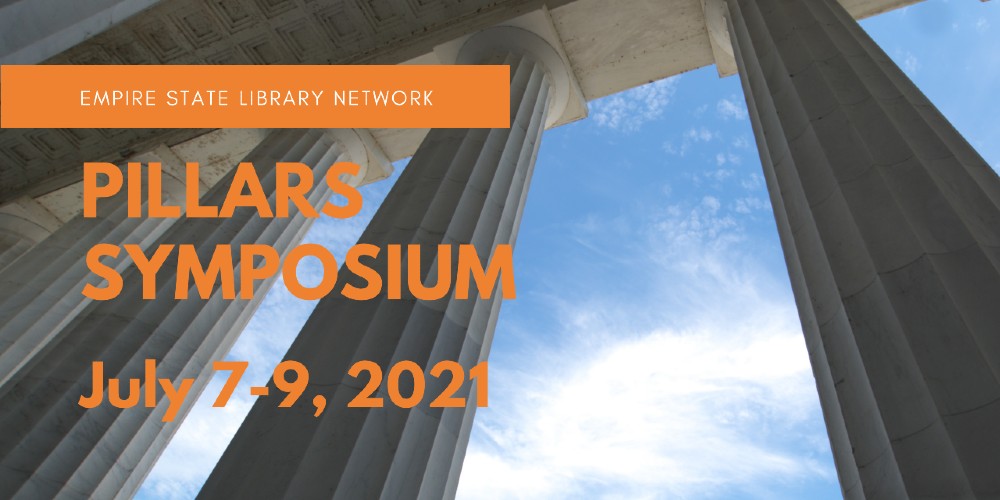
The PILLARS Symposium:
Preparation, Information Literacy, Libraries, Academic Resources,
and 21st Century Skills for Transitioning from Secondary School to College
Land Acknowledgement:
We would like to begin this symposium by acknowledging that we all work and live on the traditional territories of Indigenous Peoples. Take a moment to explore the map, identify the land you are on, languages spoken, and treaties that affect the area.
We also acknowledge that we are using equipment and high-speed internet, not available in many Indigenous communities. These technologies leave carbon footprints, contributing to changing climates that disproportionately affect Indigenous people worldwide. To that end, we can support the 2021 National Tribal Broadband Strategy & the Center for Native Peoples and the Environment.
Additional suggested places to donate related to this Symposium include the American Indian College Fund, The National Indian Education Association and the American Indian Library Association.
Resources: Adrienne Wong, Debbie Reese, Loriene Roy
2021 Symposium Program
Wednesday, July 7 – Research Skills
9:30 to 10 a.m. - Yoga/Writing Workshop
Rivka Eckert
This embodied writing workshop invites participants to get centered and connected into the wisdom of the body in order to write creatively! Participants will be guided through somatic movement, yoga asana (physical practice), and pranayama (breathwork) in order to pull creative inspiration towards written work.
 Rivka Eckert, RYT-200, is a yoga instructor, writer, and theatre-maker dedicated to living a life full of adventure, purpose, and passion. Rivka completed her 200-hour Vinyasa yoga teacher training with Yoganand Michael Carroll, Coby Kozlowski, and Erica Arce at Kripalu Center for Health and Wellness. She uses her creative and scholarly work (as a Professor of Theatre at SUNY Potsdam) to create at the intersections of social justice and community. More about her can be found at www.rivkarocchio.com
Rivka Eckert, RYT-200, is a yoga instructor, writer, and theatre-maker dedicated to living a life full of adventure, purpose, and passion. Rivka completed her 200-hour Vinyasa yoga teacher training with Yoganand Michael Carroll, Coby Kozlowski, and Erica Arce at Kripalu Center for Health and Wellness. She uses her creative and scholarly work (as a Professor of Theatre at SUNY Potsdam) to create at the intersections of social justice and community. More about her can be found at www.rivkarocchio.com
10 to 11 a.m. - Research Skills for First-Year College Students: The Library's Role
Leslie Wong Loock, Nassau Community College
Shikha Gupta Joseph, Nassau Community College
Dina Ledwith, Nassau Community College
The library can play a vital part in the instruction of first-year college students. Reference and Instruction librarians are uniquely positioned to interact with incoming students and to determine which core research skills the students are proficient in and which need to be honed with further instruction. Through working with various first-year Nassau Community College faculty, including those that teach NCC101 (the college’s first-year experience class), several different modes of information and digital literacy instruction have been developed by the library. Our presentation will include an NCC101 faculty member, Dina Ledwith, who will discuss what is expected of incoming first-year community college students in terms of information literacy. Shikha Gupta Joseph and Leslie Wong Loock, faculty librarians at NCC, will discuss how we meet the research needs of faculty and first-year college students.
The presentation will include:
- Faculty expectations of student research skills
- Information Literacy Tutorial (developed on LibWizard)
- Digital Literacy Tutorials (Blackboard based)
- Adapting to asynchronous learning formats
- Traditional information literacy formats
- 20-30 minutes for idea exchange and questions
 Leslie Wong Loock is an Assistant Professor at Nassau Community College’s A. Holly Patterson Library. As the Head of Research and Instruction, she helps to ensure that the information literacy needs of the students are met. Leslie graduated from CUNY Queens College Graduate School of Library and Information Science in 2006 and joined the librarians at NCC in 2016. Prior to working at NCC, she worked for the United States Courts, a law school, and as an attorney.
Leslie Wong Loock is an Assistant Professor at Nassau Community College’s A. Holly Patterson Library. As the Head of Research and Instruction, she helps to ensure that the information literacy needs of the students are met. Leslie graduated from CUNY Queens College Graduate School of Library and Information Science in 2006 and joined the librarians at NCC in 2016. Prior to working at NCC, she worked for the United States Courts, a law school, and as an attorney.
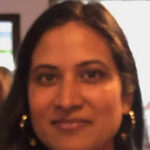 Shikha Gupta Joseph is the Emerging Technologies Librarian and Instructor at Nassau Community College’s A. Holly Patterson Library. Her duties involve working with both Research & Instruction and Resource Management Units. Shikha received her MLS from CUNY Queens College Graduate School of Library and Information Science in 2009 and joined NCC Library in 2019. Prior to working at NCC, she worked for the New York State Supreme Court, law libraries, and as an attorney.
Shikha Gupta Joseph is the Emerging Technologies Librarian and Instructor at Nassau Community College’s A. Holly Patterson Library. Her duties involve working with both Research & Instruction and Resource Management Units. Shikha received her MLS from CUNY Queens College Graduate School of Library and Information Science in 2009 and joined NCC Library in 2019. Prior to working at NCC, she worked for the New York State Supreme Court, law libraries, and as an attorney.
 Dina Ledwith is an assistant professor of writing at Nassau Community College. She also teaches NCC’s “The College Experience,” a course designed to help students make the transition to higher education by introducing campus resources and fostering the development of strong student skills. Her research interests include student resilience as well as institutional obstacles and support in community college.
Dina Ledwith is an assistant professor of writing at Nassau Community College. She also teaches NCC’s “The College Experience,” a course designed to help students make the transition to higher education by introducing campus resources and fostering the development of strong student skills. Her research interests include student resilience as well as institutional obstacles and support in community college.
10 to 11 a.m. - Research Skills for First-Year College Students: The Library's Role
Leslie Wong Loock, Nassau Community College
Shikha Gupta Joseph, Nassau Community College
Dina Ledwith, Nassau Community College
The library can play a vital part in the instruction of first-year college students. Reference and Instruction librarians are uniquely positioned to interact with incoming students and to determine which core research skills the students are proficient in and which need to be honed with further instruction. Through working with various first-year Nassau Community College faculty, including those that teach NCC101 (the college’s first-year experience class), several different modes of information and digital literacy instruction have been developed by the library. Our presentation will include an NCC101 faculty member, Dina Ledwith, who will discuss what is expected of incoming first-year community college students in terms of information literacy. Shikha Gupta Joseph and Leslie Wong Loock, faculty librarians at NCC, will discuss how we meet the research needs of faculty and first-year college students.
The presentation will include:
- Faculty expectations of student research skills
- Information Literacy Tutorial (developed on LibWizard)
- Digital Literacy Tutorials (Blackboard based)
- Adapting to asynchronous learning formats
- Traditional information literacy formats
- 20-30 minutes for idea exchange and questions
 Leslie Wong Loock is an Assistant Professor at Nassau Community College’s A. Holly Patterson Library. As the Head of Research and Instruction, she helps to ensure that the information literacy needs of the students are met. Leslie graduated from CUNY Queens College Graduate School of Library and Information Science in 2006 and joined the librarians at NCC in 2016. Prior to working at NCC, she worked for the United States Courts, a law school, and as an attorney.
Leslie Wong Loock is an Assistant Professor at Nassau Community College’s A. Holly Patterson Library. As the Head of Research and Instruction, she helps to ensure that the information literacy needs of the students are met. Leslie graduated from CUNY Queens College Graduate School of Library and Information Science in 2006 and joined the librarians at NCC in 2016. Prior to working at NCC, she worked for the United States Courts, a law school, and as an attorney.
 Shikha Gupta Joseph is the Emerging Technologies Librarian and Instructor at Nassau Community College’s A. Holly Patterson Library. Her duties involve working with both Research & Instruction and Resource Management Units. Shikha received her MLS from CUNY Queens College Graduate School of Library and Information Science in 2009 and joined NCC Library in 2019. Prior to working at NCC, she worked for the New York State Supreme Court, law libraries, and as an attorney.
Shikha Gupta Joseph is the Emerging Technologies Librarian and Instructor at Nassau Community College’s A. Holly Patterson Library. Her duties involve working with both Research & Instruction and Resource Management Units. Shikha received her MLS from CUNY Queens College Graduate School of Library and Information Science in 2009 and joined NCC Library in 2019. Prior to working at NCC, she worked for the New York State Supreme Court, law libraries, and as an attorney.
 Dina Ledwith is an assistant professor of writing at Nassau Community College. She also teaches NCC’s “The College Experience,” a course designed to help students make the transition to higher education by introducing campus resources and fostering the development of strong student skills. Her research interests include student resilience as well as institutional obstacles and support in community college.
Dina Ledwith is an assistant professor of writing at Nassau Community College. She also teaches NCC’s “The College Experience,” a course designed to help students make the transition to higher education by introducing campus resources and fostering the development of strong student skills. Her research interests include student resilience as well as institutional obstacles and support in community college.
11 a.m. to 12 p.m. - Making the Connections for Student Success: Common Themes Found in the ACRL Framework for Information Literacy, the American Association of School Librarians Standards, and the Common Core State Standards.
ViCaroline Fuchs, St. John’s University
Heather Ball, St. John’s University
In this presentation, two academic librarians will share their research study in which they did a comprehensive analysis of three foundational information literacy documents used by K-16 educators and librarians: The Common Core State Standards, The American Association of School Librarian Standards, and the ACRL Framework for Information Literacy in Higher Education. They will present their findings, which revealed the prevalence of distinct common themes throughout all three guiding documents. They will discuss how their research suggests that information literacy concepts are designed to be taught along a learning continuum, therefore making the argument that as educators we should be connecting with one another to enhance student success, rather than continuing in the traditional separated silos of K-12 and higher education.
 Caroline Fuchs is Associate Dean and Learning Design Librarian at St. John’s University.
Caroline Fuchs is Associate Dean and Learning Design Librarian at St. John’s University.
She holds an MLS, an M.A. in English and an M.A. in history, and a Senior Fellow at the Vincentian Center for Church and Society. She is an adjunct professor in the Division of Library and Information Science, a fully online master’s degree program. She teaches social justice issues and visual literacy skills through graphic novels. Active in the national library community, she has held key leadership and executive positions in the American Library Association (ALA), the Association of College and Research Libraries (ACRL), and the Reference and User Services Association (RUSA).
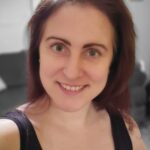 Heather F. Ball is the Digital Engagement and Student Success Librarian at St. John’s University, as well as an Assistant Professor. She holds an MLS with a dual certificate in Preservation and Archives from Queens College, as well as an MLitt (University of Glasgow) and Bachelor’s (NYU) in Medieval Studies. She also is currently an information science doctoral student at the University at Buffalo, SUNY. Her research interests and publications span qualitative and quantitative data analysis, assessment measures, information literacy instruction, digitization and encoding of historical manuscripts, Geoffrey of Monmouth, and twelfth-century Britain.
Heather F. Ball is the Digital Engagement and Student Success Librarian at St. John’s University, as well as an Assistant Professor. She holds an MLS with a dual certificate in Preservation and Archives from Queens College, as well as an MLitt (University of Glasgow) and Bachelor’s (NYU) in Medieval Studies. She also is currently an information science doctoral student at the University at Buffalo, SUNY. Her research interests and publications span qualitative and quantitative data analysis, assessment measures, information literacy instruction, digitization and encoding of historical manuscripts, Geoffrey of Monmouth, and twelfth-century Britain.
1 to 2 p.m. - Developing College-Ready Students: A Story of Collaboration and Active Learning
Jocelyn Ireland, Mohawk Valley Community College
Michael Hoover, P-TECH – Oneida-Herkimer-Madison BOCES
This presentation will be about the collaboration between P-TECH OHM BOCES and Mohawk Valley Community College. P-TECH is a high school program where students enter MVCC as part of their high school experience. As part of the collaboration, students were assigned a project, International Night, where they were tasked with researching any topic in world history using the tools available at the MVCC Utica Campus Library. Students developed a sense of continuity between the high school and college experience, developed research skills necessary for the collegiate level, and became more engaged with topics that interested them. There will be further discussion of ways secondary educators can collaborate with college librarians to prepare students for college-level research.
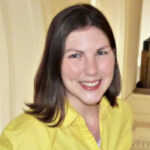 Jocelyn Ireland has been the Instructional Design Librarian at Mohawk Valley Community College since 2016. She is the president-elect of the SUNY Librarians Association (June 2021-June 2022). Jocelyn received a BA from Albion College and a MSIS from SUNY Albany. Her interests include historical fiction, online teaching and learning, OERs, and educational technology tools.
Jocelyn Ireland has been the Instructional Design Librarian at Mohawk Valley Community College since 2016. She is the president-elect of the SUNY Librarians Association (June 2021-June 2022). Jocelyn received a BA from Albion College and a MSIS from SUNY Albany. Her interests include historical fiction, online teaching and learning, OERs, and educational technology tools.
 Mike Hoover has been a social studies teacher at P-TECH OHM BOCES for four years, where high school students can earn an associate’s degree through a partnership with Mohawk Valley Community College. Prior to joining P-TECH OHM BOCES, Hoover was a social studies teacher for seven years at the Eldred Central School District in Sullivan County, NY. Hoover earned his bachelor’s degree at Hartwick College and master’s degree through Wake Forest University. Currently, he is pursuing his CAS in building and district leadership through SUNY Cortland.
Mike Hoover has been a social studies teacher at P-TECH OHM BOCES for four years, where high school students can earn an associate’s degree through a partnership with Mohawk Valley Community College. Prior to joining P-TECH OHM BOCES, Hoover was a social studies teacher for seven years at the Eldred Central School District in Sullivan County, NY. Hoover earned his bachelor’s degree at Hartwick College and master’s degree through Wake Forest University. Currently, he is pursuing his CAS in building and district leadership through SUNY Cortland.
2 to 3 p.m. - Don't Dread the Open Web: Empowering Students to be Confident, Effective, and Inclusive Information Seekers
Christine Fena, Stony Brook University
When first-year students are faced with the task of writing their first college-level research papers, instructors rightfully emphasize the importance of finding and using authoritative sources from reputable authors and publications. We, as librarians or writing instructors, excitedly share information about source types and search strategies, often inadvertently passing along imagined ideals about what college-level research is “supposed” to look like. However, we also know that focusing exclusively on scholarly articles and subscription databases will not prevent students from venturing back out to Google, nor should it. If students are taught to feel shame or embarrassment about searching on the open web, they will not grow into the confident lateral thinkers we all want them to be, and their research may even lack rigor and that all-important sense of self-discovery.
This presentation covers strategies for how to thoughtfully include some simple open web activities within information literacy instruction so that essential lifelong learning skills are taught alongside and in cooperation with how to access scholarly research articles. As information formats, types, and platforms continue to evolve and change shape, and mis- or disinformation remain ever-present forces in society, it is essential that students feel confident and effective in navigating whatever information environment they might find themselves in.
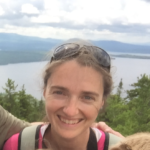 Christine Fena is Undergraduate Success Librarian at Stony Brook University, and the library liaison to the Program in Writing and Rhetoric. In addition to regularly teaching library instruction sessions, she has taught a variety of credit-bearing courses, including in the Music Department, Program in Writing and Rhetoric, and in the first-year seminar program. She holds degrees in musicology and information/library science, and her research interests include topics related to modernist music, information literacy instruction, and information behavior.
Christine Fena is Undergraduate Success Librarian at Stony Brook University, and the library liaison to the Program in Writing and Rhetoric. In addition to regularly teaching library instruction sessions, she has taught a variety of credit-bearing courses, including in the Music Department, Program in Writing and Rhetoric, and in the first-year seminar program. She holds degrees in musicology and information/library science, and her research interests include topics related to modernist music, information literacy instruction, and information behavior.
3 to 4 p.m. - What Today's Students Need to Know About Research
John Hayward, Naperville Central High School
Learn the 13 research skills post-secondary schools say are essential for today’s students to experience academic success. Finding, evaluating, and citing sources is only the beginning. We will also discuss how to use targeted searches to locate experts and conferences and how to use Google Maps as a business directory. Smarter, more effective research skills create more confident and savvy lifelong learners.
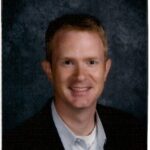 John Hayward’s experience includes over twenty-five years of either teaching high school or college English. Currently, John serves as a high school teacher-librarian by day and a composition adjunct by night in the Chicago area. In these roles, he has learned a lot about research methods and loves sharing these tips with others. He is the author of the education book Who’s Being Served? (Rowman & Littlefield, 2018).
John Hayward’s experience includes over twenty-five years of either teaching high school or college English. Currently, John serves as a high school teacher-librarian by day and a composition adjunct by night in the Chicago area. In these roles, he has learned a lot about research methods and loves sharing these tips with others. He is the author of the education book Who’s Being Served? (Rowman & Littlefield, 2018).
4 to 5 p.m. - FEATURED SPEAKERS - From First Year Experience to Teacher's Education: A Discussion on Practical Ideas for Information Literacy and Students in Transition
Raymond Pun, Education/Outreach Manager – Hoover Institution Library & Archives, Stanford University
Tarida Anantachai, Interim Head – Learning and Academic Engagement, Syracuse University Libraries
![]() For the past five years, we have seen an increasing number of positions in academic libraries called “first year experience librarian” where these positions support first year students and their library research needs. However, we also see a decreasing number of school librarian positions across the United States. Are there connections between the two groups? How are students affected by these shifts in their learning? This presentation will explore these central questions. The speaker will also highlight practical ideas on supporting information literacy (IL) for first year students and preservice teachers (before/during the pandemic). Both groups need support in transitioning to their roles. First year students benefit greatly from developing IL skills early on while preservice teachers can become IL champions to teach their students IL skills at schools without a school librarian. The discussion will also center on teaching critical information literacy skills such as privacy matters, information privilege, scholarly communications bias, and active learning techniques for in-person/online experiences.
For the past five years, we have seen an increasing number of positions in academic libraries called “first year experience librarian” where these positions support first year students and their library research needs. However, we also see a decreasing number of school librarian positions across the United States. Are there connections between the two groups? How are students affected by these shifts in their learning? This presentation will explore these central questions. The speaker will also highlight practical ideas on supporting information literacy (IL) for first year students and preservice teachers (before/during the pandemic). Both groups need support in transitioning to their roles. First year students benefit greatly from developing IL skills early on while preservice teachers can become IL champions to teach their students IL skills at schools without a school librarian. The discussion will also center on teaching critical information literacy skills such as privacy matters, information privilege, scholarly communications bias, and active learning techniques for in-person/online experiences.
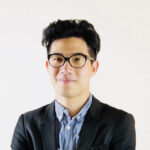 Raymond Pun (he/him) is the Education/Outreach Manager at the Hoover Institution Library & Archives, Stanford University. Previously he has worked as a school and public librarian in various roles. He holds a Doctorate in Education, a Master of Library Science (MLS) and Master of Arts in East Asian Studies and a Bachelor of Arts in History. Ray is a member of Library Freedom Institute (LFI), the Association of College and Research Libraries (ACRL) and the American Association of School Librarians (AASL). In July 2021, Ray will serve as the President of the Asian/Pacific American Librarians Association (APALA) and Vice President of the Chinese American Librarians Association (CALA).
Raymond Pun (he/him) is the Education/Outreach Manager at the Hoover Institution Library & Archives, Stanford University. Previously he has worked as a school and public librarian in various roles. He holds a Doctorate in Education, a Master of Library Science (MLS) and Master of Arts in East Asian Studies and a Bachelor of Arts in History. Ray is a member of Library Freedom Institute (LFI), the Association of College and Research Libraries (ACRL) and the American Association of School Librarians (AASL). In July 2021, Ray will serve as the President of the Asian/Pacific American Librarians Association (APALA) and Vice President of the Chinese American Librarians Association (CALA).
 Tarida Anantachai is currently the Interim Head of the Department of Learning and Academic Engagement at the Syracuse University Libraries. Her professional and research interests include diversity, equity, and inclusion; early career development and mentoring; and outreach programming. Tarida was an ALA Emerging Leader, an alumna of the Minnesota Institute for Early Career Librarians, and a current fellow in the ARL Leadership and Career Development Program. Tarida received her MS in library and information science from the University of Illinois at Urbana-Champaign.
Tarida Anantachai is currently the Interim Head of the Department of Learning and Academic Engagement at the Syracuse University Libraries. Her professional and research interests include diversity, equity, and inclusion; early career development and mentoring; and outreach programming. Tarida was an ALA Emerging Leader, an alumna of the Minnesota Institute for Early Career Librarians, and a current fellow in the ARL Leadership and Career Development Program. Tarida received her MS in library and information science from the University of Illinois at Urbana-Champaign.
*This presentation will be audio-only. You will log in to the Zoom webinar to attend, but there will be no visual component other than closed captioning.
Thursday, July 8 – Working with the Community
9:30 to 10 a.m. - Good For Your Soul: A Cooking Show with Ms. Sarah - Dutch Babies for Breakfast!
Sarah Gluck, Queens Public Library
Join Ms. Sarah for a quick sweet and savory Dutch Baby Breakfast. We’ll learn to make the dutch baby base and all the fun things we can pile on depending on your mood or what’s in your fridge.
Here is a recipe for the dutch babies (adapted from Smitten Kitchen):
Sweet Dutch Baby
2 to 3 tablespoons unsalted butter
4 large eggs
1/2 cup (65 grams) all-purpose flour
1/2 cup milk (ideally whole milk but most varieties will work)
1 tablespoon granulated sugar
1/4 teaspoon kosher salt
Powdered sugar to finish
Options for toppings
Lemon juice
Syrup
Fresh berries
Shaved chocolate
Chocolate sauce
Cinnamon Sugar
Sliced fruit (soft fruit, banana, pear, peach)
Savory Dutch Baby
2 to 3 tablespoons unsalted butter
4 large eggs
1/2 cup (65 grams) all-purpose flour
1/2 cup milk (ideally whole milk but most varieties will work)
1/4 teaspoon kosher salt
Freshly ground black pepper
Options for toppings:
wilted spinach or sauteed greens
bacon or ham
2 tablespoons finely chopped fresh thyme
2 tablespoons minced chives, parsley or tarragon
¾ cup grated Parmigiano-Reggiano or Gruyère (or any cheese)
Sundried Tomato
Flaky sea salt, for garnish
Sriracha, for serving (optional)
Lemon wedges, for serving
Heat oven to 425 degrees F with one 12-inch round ovenproof skillet, or two 9-inch round ovenproof skillets, inside.
In a large bowl, beat eggs thoroughly with a whisk or fork. Add salt and flour, whisk until lumps disappear. Add milk, whisking until smooth. For sweet add 1 tablespoon granulated sugar to the batter; For savory, add freshly ground black pepper.
When oven and baking vessel are fully heated, carefully remove skillet(s) from the oven. Melt butter inside and roll it around so it goes up the sides, too.
Pour batter into buttered dish(es) and return to the oven. Bake for 12 to 13 minutes to start, and then in additional 1 to 2 minute increments until the edges are deeply golden brown and the centers are just beginning to color. Have your finishes ready to go. Transfer to a cooling back or trivet.
Eat immediately; these pancakes are best hot from the oven.
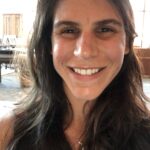 Sarah Gluck has been working as a public librarian for her entire career. She began her career as a manager at Providence Community Libraries and is currently an Assistant Manager at Queens Public Library. As part of her work at Langston Hughes Library and Cultural Center, Queens Public Library, Ms. Gluck started a virtual community cooking show in the early pandemic, April 2020. With “chef guests” from the community inspiring onlookers to cook new dishes, the show has been a place for community members to gather virtually and have a nice distraction each week.
Sarah Gluck has been working as a public librarian for her entire career. She began her career as a manager at Providence Community Libraries and is currently an Assistant Manager at Queens Public Library. As part of her work at Langston Hughes Library and Cultural Center, Queens Public Library, Ms. Gluck started a virtual community cooking show in the early pandemic, April 2020. With “chef guests” from the community inspiring onlookers to cook new dishes, the show has been a place for community members to gather virtually and have a nice distraction each week.
10 to 11 a.m. - Partnering with the Community to Help Students Transition
Carli Wright, Randolph Central School MS/HS
Allison Fischer, SUNY Erie Community College & Daemen College
Maria Lowe, Buffalo & Erie County Public Central Library
Dani Newman, Cattaraugus Allegany BOCES
Amy Rockwell, SUNY Buffalo State
This presentation will discuss a program that was originally designed by Wright, a secondary school media specialist, for high school seniors. Wright created a field trip that reintroduced students to the community in which they were raised, but this time, from the perspective of an adult. This walking field trip around the town helped students learn where to go and who to ask for many basic adult functions within their community. The co-presenters, a mix of academic, public, and school librarians, will show how this program can transcend the school setting and help the various types of libraries truly become the information center of the community.
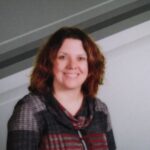 Carli Wright was a special education teacher for 17 years, receiving her school library media degree in 2003, before being hired at Randolph Central School as the MS/HS librarian in 2018. Randolph was the district where Carli grew up and now lives with her family. Her ties to the community come from having an intimate knowledge of the town. While in special education, Carli attended many trainings and was actively involved in the high school transition to adulthood for students with special needs. Being in the high school library allowed Carli to share her vision, with the school district, on the importance of developing these transition opportunities for all students.
Carli Wright was a special education teacher for 17 years, receiving her school library media degree in 2003, before being hired at Randolph Central School as the MS/HS librarian in 2018. Randolph was the district where Carli grew up and now lives with her family. Her ties to the community come from having an intimate knowledge of the town. While in special education, Carli attended many trainings and was actively involved in the high school transition to adulthood for students with special needs. Being in the high school library allowed Carli to share her vision, with the school district, on the importance of developing these transition opportunities for all students.
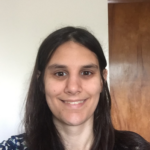 Allison Fischer is a part-time collections librarian at SUNY Erie Community College and a Weekend Library Supervisor at Daemen College. Allison has a master’s in library and Information Studies, an Ed. M. General Education from University at Buffalo and a B.S. in Human Services from Elmira College. Allison’s interests include mental health and equity, diversity, and inclusion (EDI) in the library setting.
Allison Fischer is a part-time collections librarian at SUNY Erie Community College and a Weekend Library Supervisor at Daemen College. Allison has a master’s in library and Information Studies, an Ed. M. General Education from University at Buffalo and a B.S. in Human Services from Elmira College. Allison’s interests include mental health and equity, diversity, and inclusion (EDI) in the library setting.
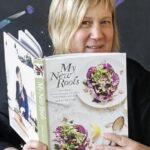 Maria Lowe has sixteen years of experience working as both a public and academic librarian for several library systems. She earned her master’s degree in Library Science from the University of Illinois. Maria currently works as the Teen Services and Outreach Librarian at the Buffalo & Erie County Public Central Library.
Maria Lowe has sixteen years of experience working as both a public and academic librarian for several library systems. She earned her master’s degree in Library Science from the University of Illinois. Maria currently works as the Teen Services and Outreach Librarian at the Buffalo & Erie County Public Central Library.
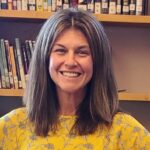 Dani Newman has been a library media specialist for three years at Fillmore CSD and will begin a new position with Cattaraugus Allegany BOCES as a librarian at Cattaraugus/Little Valley and Friendship Central Schools. Previously, Newman worked as a high school English teacher and a professor of English Composition at the University of Pittsburgh-Bradford. She enjoys spending time with her grandson, playing softball, hunting, hanging out with her Adventure Club, and running 5Ks.
Dani Newman has been a library media specialist for three years at Fillmore CSD and will begin a new position with Cattaraugus Allegany BOCES as a librarian at Cattaraugus/Little Valley and Friendship Central Schools. Previously, Newman worked as a high school English teacher and a professor of English Composition at the University of Pittsburgh-Bradford. She enjoys spending time with her grandson, playing softball, hunting, hanging out with her Adventure Club, and running 5Ks.
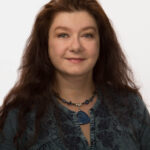 Amy Rockwell has enjoyed working with and teaching students as a reference and instruction librarian at SUNY Buffalo State for 35 years. She currently serves as the First-Year Experience Librarian and the Library Liaison to the college’s Student Accessibility Services. She holds both a Master of Library Science and a Master of Science in Rehabilitation Counseling from the University at Buffalo.
Amy Rockwell has enjoyed working with and teaching students as a reference and instruction librarian at SUNY Buffalo State for 35 years. She currently serves as the First-Year Experience Librarian and the Library Liaison to the college’s Student Accessibility Services. She holds both a Master of Library Science and a Master of Science in Rehabilitation Counseling from the University at Buffalo.
11 a.m. to 12 p.m. - Digital History with Timeline JS
Chelsea Gibson, Binghamton University
This presentation will explore how to teach students analytical, research, and digital literacy skills using Knightlab’s Timeline JS online program (https://timeline.knightlab.com/). The program has many applications, but this presentation will focus on an assignment in which students use digitized oral histories to create a timeline of someone’s life. We’ll explore how this assignment teaches students how to find and use digital sources, learn about copyright, and strengthen their skills in historical analysis.
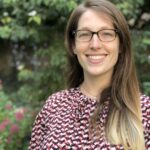 Chelsea Gibson is a Visiting Assistant Professor of History at Binghamton University where she teaches courses on American and Russian history. You can find out more about her research and teaching experience at chelseacgibson.com or follow her on Twitter @gibsoche
Chelsea Gibson is a Visiting Assistant Professor of History at Binghamton University where she teaches courses on American and Russian history. You can find out more about her research and teaching experience at chelseacgibson.com or follow her on Twitter @gibsoche
1 to 2 p.m. - College and Career Pathways at The New York Public Library: Filling the College Access Gap in an Urban Setting
Katrina Ortega, The New York Public Library
Leanne Minkoff, The New York Public Library
Katrina Ortega, manager of the College and Career Pathways (CCP) program at the New York Public Library (NYPL), and Leanne Minkoff, CCP Hub Librarian, will present a case study of the approach taken at NYPL to reach college-bound young adults throughout New York City. With ten of NYPL’s 92 branch locations serving as CCP hubs, the library offers an intensive grant program, one-on-one counseling sessions, and innovative college and career-focused events. CCP involves careful centralized planning, special staff training for librarians at CCP hubs, and significant effort on behalf of the branch staff to facilitate programs at the branches. The presenters will share how the CCP program combines and utilizes centralized and branch staff efforts and expertise to successfully facilitate college readiness programming in an urban public library setting
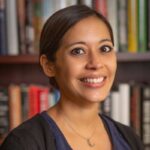 Katrina Ortega (M.L.I.S., M.A.) is the manager of the New York Public Library’s College and Career Pathways program. Originally from El Paso, Texas, she’s lived in NYC for almost a decade. She is a strong advocate of continuing education (in all of its forms) and is very interested in learning new ways that public libraries can provide higher education to all. She is also very interested in working with non-traditional communities in the library, particularly incarcerated and homeless populations. Katrina loves reading most anything, but particularly loves literary fiction, YA novels, and any type of graphic novel or comic. In her free time, if she’s not reading, Katrina loves to walk around New York, looking for good places to eat.
Katrina Ortega (M.L.I.S., M.A.) is the manager of the New York Public Library’s College and Career Pathways program. Originally from El Paso, Texas, she’s lived in NYC for almost a decade. She is a strong advocate of continuing education (in all of its forms) and is very interested in learning new ways that public libraries can provide higher education to all. She is also very interested in working with non-traditional communities in the library, particularly incarcerated and homeless populations. Katrina loves reading most anything, but particularly loves literary fiction, YA novels, and any type of graphic novel or comic. In her free time, if she’s not reading, Katrina loves to walk around New York, looking for good places to eat.
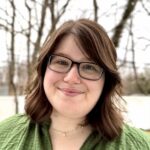 Leanne Minkoff is a Young Adult Librarian and College & Career Pathways (CCP) Hub Librarian at The New York Public Library. She received her MSLIS from Syracuse University in 2019, and has strong interests in college and career readiness, digital communication, and information literacy instruction. Leanne’s favorite part of being a CCP Hub Librarian is helping high school students achieve their goals both big and small. In her free time, Leanne enjoys going on road trips and crafting with her Cricut.
Leanne Minkoff is a Young Adult Librarian and College & Career Pathways (CCP) Hub Librarian at The New York Public Library. She received her MSLIS from Syracuse University in 2019, and has strong interests in college and career readiness, digital communication, and information literacy instruction. Leanne’s favorite part of being a CCP Hub Librarian is helping high school students achieve their goals both big and small. In her free time, Leanne enjoys going on road trips and crafting with her Cricut.
2 to 3 p.m. - Data Zines: A Hands-On Approach to Community Curiosities
Tess Wilson, Network of the National Library of Medicine – Middle Atlantic Region
In 2017, Tess Wilson partnered with the Western Pennsylvania Regional Data Center (WRPDC) to present a week-long workshop for teens at their local public library. Engaging teens in civic change and community involvement through open data was a priority throughout the week. With the help of reporters and library staff, teens explored local data repositories and open data portals to find topics relevant to their interests and larger community needs. The result of the workshop was a set of teen-produced zines that examined their city through a civic data lens. This workshop is low-cost and highly replicable for a wide variety of age ranges, community types, and topics of interest. Overall, this proved to be an exciting and innovative way to engage intimately with community data!
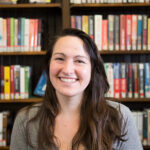 Tess Wilson is a librarian who loves talking loudly about digital literacy, equitable access, and online privacy. Beyond her library work, she is an arts educator, mentor trainer, and zine enthusiast. She’s a collector of many things, from small rocks to big books.
Tess Wilson is a librarian who loves talking loudly about digital literacy, equitable access, and online privacy. Beyond her library work, she is an arts educator, mentor trainer, and zine enthusiast. She’s a collector of many things, from small rocks to big books.
3 to 4 p.m. - Digital Research Course: A First Step to College Transitioning
Melissa Balk, Thousand Islands High School
In 2007, Jefferson Community College and Jefferson Lewis BOCES librarians formed the “Bridging the Gap” project to ensure that students are prepared to meet the demands and expectations of college-level research, workforce preparedness, and informed citizenship. Melissa Balk, a high school librarian and member of that working group, created an elective course for high school seniors called Digital Research in response. This 20-week course will be outlined, including the newest web resources that teach students to identify misinformation and disinformation.
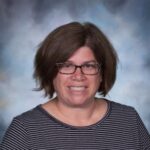 Melissa Balk is a librarian at Thousand Islands High/Middle School in Clayton, New York. After earning her MLS from Syracuse University, she worked in a variety of school districts around the state including: Lafayette at the Onondaga Nation School, OCM BOCES, Deer Park School District, and Canajoharie School District. For the past fourteen years, her focus has been teaching digital literacy skills to students. Melissa has been raising her family with her husband in the North Country, spending many hours in ice rinks, horse barns and sugar shacks. You can reach her at balkm@ticsd.org or follow her @balkm on Twitter.
Melissa Balk is a librarian at Thousand Islands High/Middle School in Clayton, New York. After earning her MLS from Syracuse University, she worked in a variety of school districts around the state including: Lafayette at the Onondaga Nation School, OCM BOCES, Deer Park School District, and Canajoharie School District. For the past fourteen years, her focus has been teaching digital literacy skills to students. Melissa has been raising her family with her husband in the North Country, spending many hours in ice rinks, horse barns and sugar shacks. You can reach her at balkm@ticsd.org or follow her @balkm on Twitter.
4 to 5 p.m. - Reinforcement and Rapport: Supporting English Language Learners in Academic Libraries
Megan Margino Marchese, Farmingdale State College
![]() While many first-year college students experience challenges adjusting to college-level research, English Language Learners (ELLs) face additional barriers to success. Through reference, instruction, and other research support, academic librarians work to equip students with the tools they need to succeed in college. As colleges become increasingly linguistically diverse, academic librarians must adapt to support the growing numbers of ELLs in the campus community.
While many first-year college students experience challenges adjusting to college-level research, English Language Learners (ELLs) face additional barriers to success. Through reference, instruction, and other research support, academic librarians work to equip students with the tools they need to succeed in college. As colleges become increasingly linguistically diverse, academic librarians must adapt to support the growing numbers of ELLs in the campus community.
This presentation will discuss best practices in working with ELL students, including strategies that librarians can incorporate in information literacy instruction and in reference inquiries. As a Reference and Instruction Librarian with an MA in TESOL, Megan will share guidance on how academic libraries can contribute to language learners’ college success.
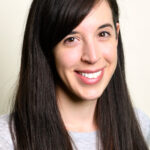 Megan Margino Marchese is a Reference and Instruction Librarian at Farmingdale State College, SUNY. She holds an MS in Library and Information Science from St. John’s University and an MA in Teaching English to Speakers of Other Languages (TESOL) from Stony Brook University. Megan teaches information literacy skills to students across the Farmingdale curriculum and hopes to support all students in becoming excellent researchers.
Megan Margino Marchese is a Reference and Instruction Librarian at Farmingdale State College, SUNY. She holds an MS in Library and Information Science from St. John’s University and an MA in Teaching English to Speakers of Other Languages (TESOL) from Stony Brook University. Megan teaches information literacy skills to students across the Farmingdale curriculum and hopes to support all students in becoming excellent researchers.
*This presentation will be audio-only. You will log in to the Zoom webinar to attend, but there will be no visual component other than closed captioning.
Friday, July 9 – Preparing for the Future
9:30 to 10 a.m. - Morning Mindfulness Art Therapy Workshop
Lena De Leo
Enjoy creative expression to help clear your mind and get you into a calm headspace for your last day of training! In this workshop, we will explore how art-making can lower stress, relieve anxiety, and improve overall wellness. You will be guided through an art therapy directive. Participants are invited to bring any 2-D colorful art materials and a few sheets of paper to this session. (Crayons, colored pencils, markers, pens, paints, whatever you have on hand). Absolutely NO artistic ability is required to participate, as art therapy is about the PROCESS not the product!
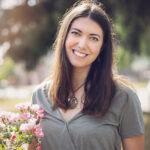 Lena De Leo is a Licensed and Board Certified Creative Arts Therapist. After 8 years working in the residential setting with youth and their families, she is now in private practice in Syracuse, NY, working primarily with teens and young adults. She has always believed in the healing power of art, especially when painful experiences and overwhelming emotions may be too difficult to put into words. Art therapy allows for a powerful emotional outlet, encourages development of a stronger connection with both the individual and their community, and helps a person practice mindfulness and acceptance. In her practice, Lena focuses most on partnering with individuals who need help getting unstuck, who are struggling with body image issues or eating disorder recovery, and who are seeking help navigating anxiety, depression, or grief.
Lena De Leo is a Licensed and Board Certified Creative Arts Therapist. After 8 years working in the residential setting with youth and their families, she is now in private practice in Syracuse, NY, working primarily with teens and young adults. She has always believed in the healing power of art, especially when painful experiences and overwhelming emotions may be too difficult to put into words. Art therapy allows for a powerful emotional outlet, encourages development of a stronger connection with both the individual and their community, and helps a person practice mindfulness and acceptance. In her practice, Lena focuses most on partnering with individuals who need help getting unstuck, who are struggling with body image issues or eating disorder recovery, and who are seeking help navigating anxiety, depression, or grief.
10 to 11 a.m. - "Aligning the Curriculums for College Success" High School and College Library Collaborations
Carl R. Andrews, Bronx Community College
Dickens Saint Hilaire, Bronx Community College
Many students enter college lacking the necessary research and critical thinking skills needed for academic success. A strong body of literature shows evidence that information literacy instruction at the secondary level enhances college readiness in freshman students. The presenters discuss the importance of collaborative curriculum development and the role academic libraries play in supporting college readiness. The research will review and cite successful high school and college partnerships, curriculum development initiatives, secondary information literacy instruction, and teacher professional development. The utilization of select library databases as a tool to promote college readiness is also discussed.
 Carl R. Andrews is a Reference & Instruction Librarian with Bronx Community College (CUNY), and a part-time Reference Librarian with the Yonkers Public Library. His research interests include: Embedded Librarianship, Information Literacy Instruction, and the academic librarian’s role in supporting College Readiness, the First Year Experience, and Adult Learners in Higher Education. Throughout his tenure as an academic librarian he has published papers in the International Journal of Educational Organization & Leadership; the International Journal of Learning; and Codex: the Journal of the Louisiana Chapter of ACRL.
Carl R. Andrews is a Reference & Instruction Librarian with Bronx Community College (CUNY), and a part-time Reference Librarian with the Yonkers Public Library. His research interests include: Embedded Librarianship, Information Literacy Instruction, and the academic librarian’s role in supporting College Readiness, the First Year Experience, and Adult Learners in Higher Education. Throughout his tenure as an academic librarian he has published papers in the International Journal of Educational Organization & Leadership; the International Journal of Learning; and Codex: the Journal of the Louisiana Chapter of ACRL.
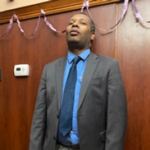 Dr. Dickens Saint Hilaire is an Associate Professor in The Chemistry, Earth Science and Environmental Science Department at Bronx Community College of the City University of New York. He teaches Introduction to Chemistry, Fundamentals of General Chemistry, College General Chemistry I and II. His research interests focus on pedagogy and chemical research. His pedagogical work focuses on increasing student retention and graduation rates. His chemical research focuses on the analysis of rainwater, snow and Greenhouse Gases (carbon dioxide and methane). Some of his published work includes the following:
Dr. Dickens Saint Hilaire is an Associate Professor in The Chemistry, Earth Science and Environmental Science Department at Bronx Community College of the City University of New York. He teaches Introduction to Chemistry, Fundamentals of General Chemistry, College General Chemistry I and II. His research interests focus on pedagogy and chemical research. His pedagogical work focuses on increasing student retention and graduation rates. His chemical research focuses on the analysis of rainwater, snow and Greenhouse Gases (carbon dioxide and methane). Some of his published work includes the following:
Strothers, J., Matthews, R. B., Toney, A., Cobham, M. R., Cox, S., Ford, W., Joseph, S., Joyette, W., Khadka, S., Pinnock, S., Burns, M., Noel, M., Tamang, M. G., Saint Hilaire, D., Kim, J.-H., & Pratt, L. M. (2019). Hydrocarbon fuel from brown grease: Effects of reaction temperature profile on yields and product distribution. Fuel, 239, 573–578.
Andrews, C. R., & Saint Hilaire, D. (2017). Aligning the Curriculums for College Success: High School and College Library Collaborations. Community & Junior College Libraries, 23(1/2), 41–62.
Saint-Hilaire, D., & Jans, U. (2013). Reactions of three halogenated organophosphorus flame retardants with reduced sulfur species. Chemosphere, 93(9), 2033–2039.
Saint-Hilaire, D., Ismail, K. Z., & Jans, U. (2011). Reaction of tris (2-chloroethyl) phosphate with reduced sulfur species. Chemosphere, 83(7), 941–947.
11 a.m. to 12 p.m. - Digital Literacy Skills in an Inequitable Arena: How Will We Address Post-Pandemic Knowledge Gap in Classrooms for Student Success?
Jenna Pitera, Skidmore College
Maria Ishaq Khan, University at Albany
The pandemic has further exacerbated existing inequities in digital access, skills, and comprehension especially for marginalized and low-income communities. As we move into the second year of this pandemic, we realize that the majority of our students from under-resourced school districts will not be ready for college upon graduation. These high school graduates will no doubt have a wide array of skills and knowledge bases, but they may not have research or learning skills essential for college success. In our presentation, as a librarian and an education researcher, we will discuss the following questions:
- How do we ensure a smooth transition for students from high school to college?
- How do we individualize student learning at the college level for student success?
- What means can we use to assess and respond to the needs of students who may not have worked with a college librarian in a physical library for over a year?
During our session, we will be conducting a live poll to engage with the audience and get their opinions on issues that lead to inequities in digital literacy skills. After the poll, we will use improvement science strategies such as the root-cause analysis to take a deeper dive and systematically identify barriers and move forward to find solutions and prevent them. Our focus will remain on equity and student success through digital literacy skills in the post-pandemic world.
 Jenna Pitera is the Science Librarian at Skidmore College, where she teaches one-credit information literacy courses. She received her MLIS from the University of Rhode Island. She previously worked as an instructional designer at Rensselaer Polytechnic Institute and the University at Albany. She has a passion for active learning and creating engaging, meaningful student interactions. She is a proud trustee of the Albany Public Library.
Jenna Pitera is the Science Librarian at Skidmore College, where she teaches one-credit information literacy courses. She received her MLIS from the University of Rhode Island. She previously worked as an instructional designer at Rensselaer Polytechnic Institute and the University at Albany. She has a passion for active learning and creating engaging, meaningful student interactions. She is a proud trustee of the Albany Public Library.
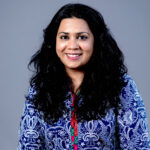 Maria Ishaq Khan currently serves as the Assistant Director of the Systems Center, School of Education, University at Albany- SUNY. In this role, she manages the administrative and research operations of various projects in the areas of improvement science, higher education leadership, student success, equity and community partnerships.
Maria Ishaq Khan currently serves as the Assistant Director of the Systems Center, School of Education, University at Albany- SUNY. In this role, she manages the administrative and research operations of various projects in the areas of improvement science, higher education leadership, student success, equity and community partnerships.
Maria is also a Ph.D. candidate in the Department of Educational Policy and Leadership (EPL) at University at Albany, SUNY. Before receiving a Master’s degree at EPL on a Fulbright scholarship, she has earned a BS in Mathematics and an MS in Accounting & Finance from Kinnaird College for Women, Pakistan. Her research interests include student success, educational development, policy and leadership in comparative and international education.
Maria’s experiences in Pakistan and the U.S. have helped her acquire a systemic lens when developing cross-sector strategies in different educational and social contexts. Previously, she has worked as an educator and a teacher-trainer in Pakistan, as well as taught undergraduate classes on social foundations of education at UAlbany. Maria has also briefly worked at the SAIL Institute which aims to support higher education leaders through programming and services throughout SUNY and beyond.
1 to 2 p.m. - An Inadvertent Opportunity: Open Access, Digital Equity, and a High School-College Collaboration
Kristen Totleben, University of Rochester
Danyelle Westbrook, Victor High School
Eileen Daly-Boas, University of Rochester
In the past, high school and college students have been discouraged from using the internet to get sources for research, and to instead, rely on vetted, closed resources from the library’s collections, especially books and subscription databases. More recently, sites like Google Scholar and Google Books have become acceptable places to explore and discover research materials, although the expectation by instructors and librarians has still been to favor the subscription databases through the library. With the rise of COVID-19, social distancing, and the resulting diminished amount of resources at their fingertips, students are now limited to online, primarily open access resources, supplemented by their library’s online subscriptions. This has provided an inadvertent opportunity for high school and college librarians and instructors to promote and evaluate open access (OA) resources to their students. The presenters will discuss and analyze the benefits of identifying, evaluating and discovering open access resources for research. Our case study is the collaboration between Victor High School and the River Campus Libraries at the University of Rochester, where our students successfully incorporated open access sources for a capstone research project.
The OA movement is growing in momentum, but most high school and college students do not have awareness of open access sources. OA is a pathway towards digital equity. It is imperative to prepare all students for their current and future scholarly and personal research endeavors. One way is to introduce them to open access scholarly resources, repositories and giving them the tools to evaluate them. This presentation will model one such path.
 Kristen Totleben is the liaison librarian for the Modern Languages and Cultures Department at the University of Rochester. Her current research interests include open pedagogy, working with special collections and open peer review.
Kristen Totleben is the liaison librarian for the Modern Languages and Cultures Department at the University of Rochester. Her current research interests include open pedagogy, working with special collections and open peer review.
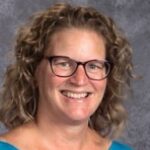 Danyelle Westbrook is a high school librarian. She just finished her 10th year at Victor High School. Before that, she worked for a year at FLCC as a reference librarian.
Danyelle Westbrook is a high school librarian. She just finished her 10th year at Victor High School. Before that, she worked for a year at FLCC as a reference librarian.
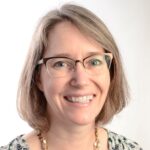 Eileen Daly-Boas is the liaison librarian for Education and Philosophy at River Campus Libraries at the University of Rochester. Her academic interests include equity in education, high-school to college transitions, and digital scholarship.
Eileen Daly-Boas is the liaison librarian for Education and Philosophy at River Campus Libraries at the University of Rochester. Her academic interests include equity in education, high-school to college transitions, and digital scholarship.
2 to 3:30 p.m. - High School to College Roundtable
Facilitator – Sue LeBlanc, Madison-Oneida BOCES
Enhancing Engagement in Online Information Literacy Sessions with Google Forms Activities – Danielle S. Apfelbaum, SUNY Farmingdale State College
Don’t Panic!: Seniors and the College Library – Kathy Starks, Owego Free Academy
The Misinformation Pandemic: Approaches to Teaching First-Year College Students – Michelle Bishop, SUNY Oswego & Kenneth Nichols, SUNY Oswego
College Readiness: English Composition – Theresa Zahor, SUNY Farmingdale State College & Franki Kessler, SUNY Farmingdale State College
Authentic Connections: Engaging with the Library Through Distance Learning – Kari Whitney, Pierce College; Kelle Rose, Pierce College; Lizz Zitron, Pierce College; Beth Thoms, Pierce College
Using Appreciative Inquiry to Improve Instruction – Amber Wessies, Union University
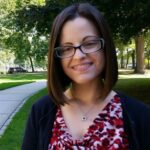 Danielle S. Apfelbaum serves as the Scholarly Communication Librarian at Farmingdale State College. In addition to holding an M.S. in Library and Information Science, she has also earned an M.S. in Instructional Technology and is currently working on a Ph.D. in Curriculum, Instruction, and the Science of Learning.
Danielle S. Apfelbaum serves as the Scholarly Communication Librarian at Farmingdale State College. In addition to holding an M.S. in Library and Information Science, she has also earned an M.S. in Instructional Technology and is currently working on a Ph.D. in Curriculum, Instruction, and the Science of Learning.
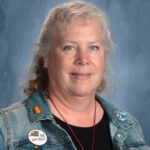 Kathy Starks, MLIS, is a library media specialist at Owego Free Academy in Owego, NY. She earned her bachelor’s degree in English at Carleton College in Northfield, MN, and, after managing the Gothic Bookshop at Duke University, returned to school to earn her master’s degree in Library and Information Science at the University of North Carolina at Greensboro. Kathy has taught in such diverse geographical areas as North Carolina, Georgia, and now New York, where she develops original collaborative lesson plans, presents on educational technology and best practices at local, state, and national conferences, and shares her love of reading with students from Kindergarten to 12th grade. Nearly two decades after starting her library career, Kathy continues to find new appreciation for her profession, her students in the Owego Apalachin Central School District in Owego, NY, and her teaching colleague.
Kathy Starks, MLIS, is a library media specialist at Owego Free Academy in Owego, NY. She earned her bachelor’s degree in English at Carleton College in Northfield, MN, and, after managing the Gothic Bookshop at Duke University, returned to school to earn her master’s degree in Library and Information Science at the University of North Carolina at Greensboro. Kathy has taught in such diverse geographical areas as North Carolina, Georgia, and now New York, where she develops original collaborative lesson plans, presents on educational technology and best practices at local, state, and national conferences, and shares her love of reading with students from Kindergarten to 12th grade. Nearly two decades after starting her library career, Kathy continues to find new appreciation for her profession, her students in the Owego Apalachin Central School District in Owego, NY, and her teaching colleague.
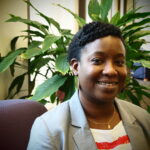 Michelle Bishop is SUNY Oswego’s First-Year Experience Librarian. She instructs information literacy concepts specific to the unique needs of first-year college students. She is a member of NNYLN’s Board of Trustees and NNYLN’s High School to College Interest Group.
Michelle Bishop is SUNY Oswego’s First-Year Experience Librarian. She instructs information literacy concepts specific to the unique needs of first-year college students. She is a member of NNYLN’s Board of Trustees and NNYLN’s High School to College Interest Group.
Kenneth Nichols is an English Department Writing Fellow at SUNY Oswego. He also self-publishes Young Adult novels and romantic comedies.
 Theresa Zahor, MLIS, MA is the head of Reference Services and Information Literacy at SUNY Farmingdale State College. She directs the library instruction program at FSC, working with faculty on integrating library resources into their curriculum. Theresa teaches Information Literacy classes in all disciplines as well as manages the Information Literacy Assessment program evaluating student’s research ability for English 101 Composition classes. She is active in campus governance and currently serves as a standard Co-Chair on the Middle State re-accreditation process.
Theresa Zahor, MLIS, MA is the head of Reference Services and Information Literacy at SUNY Farmingdale State College. She directs the library instruction program at FSC, working with faculty on integrating library resources into their curriculum. Theresa teaches Information Literacy classes in all disciplines as well as manages the Information Literacy Assessment program evaluating student’s research ability for English 101 Composition classes. She is active in campus governance and currently serves as a standard Co-Chair on the Middle State re-accreditation process.
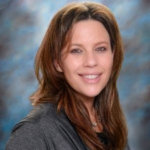 Franki Kessler is an English professor at SUNY Farmingdale. She has been teaching English at the college level for 25 years. Her specialties include English composition, research and public speaking. Ms. Kessler has collaborated with the Greenley Library to evaluate and ensure the information literacy of her students in their required research papers. In addition, she has extensive experience teaching ESL, especially at the advanced level where students prepare to move into first-year composition classes. Ms. Kessler has a Bachelor of Arts degree and a Higher Education diploma from South Africa.
Franki Kessler is an English professor at SUNY Farmingdale. She has been teaching English at the college level for 25 years. Her specialties include English composition, research and public speaking. Ms. Kessler has collaborated with the Greenley Library to evaluate and ensure the information literacy of her students in their required research papers. In addition, she has extensive experience teaching ESL, especially at the advanced level where students prepare to move into first-year composition classes. Ms. Kessler has a Bachelor of Arts degree and a Higher Education diploma from South Africa.
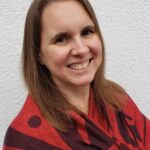 Kari Whitney (she/her/hers) is an adjunct faculty reference and instruction librarian at Pierce College in Washington State. Prior to Pierce, she was a reference specialist at the University of Washington Tacoma Library, and prior to that she worked in fundraising and volunteer management roles at Tacoma-area independent schools. While residing for over two decades in the Tacoma area, Whitney is originally from Juneau, Alaska, and descends from Tlingit and Norwegian ancestry. She is passionate about Indigenous representation, supporting equity in online learning, and connecting individually with people to support their intellectual curiosity. If asked, she will show you her Miss Juneau 1992 First Runner-Up trophy.
Kari Whitney (she/her/hers) is an adjunct faculty reference and instruction librarian at Pierce College in Washington State. Prior to Pierce, she was a reference specialist at the University of Washington Tacoma Library, and prior to that she worked in fundraising and volunteer management roles at Tacoma-area independent schools. While residing for over two decades in the Tacoma area, Whitney is originally from Juneau, Alaska, and descends from Tlingit and Norwegian ancestry. She is passionate about Indigenous representation, supporting equity in online learning, and connecting individually with people to support their intellectual curiosity. If asked, she will show you her Miss Juneau 1992 First Runner-Up trophy.
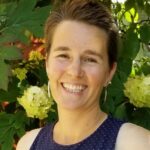 Kelle Rose works in adjunct faculty librarian roles teaching research and information literacy at Seattle-area two-year colleges including Pierce College. Prior to becoming an academic librarian, she spent more than a decade in the nonprofit sector as a macro-social worker conducting social policy advocacy and community development. Her interests lie in the intersection of her two fields around issues of equity in access to information to empower individuals and communities.
Kelle Rose works in adjunct faculty librarian roles teaching research and information literacy at Seattle-area two-year colleges including Pierce College. Prior to becoming an academic librarian, she spent more than a decade in the nonprofit sector as a macro-social worker conducting social policy advocacy and community development. Her interests lie in the intersection of her two fields around issues of equity in access to information to empower individuals and communities.
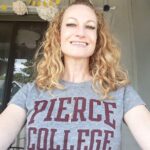 Lizz Zitron is the Assistant Professor and Chair in the College Success program. Before that, she was a teaching librarian for 10 years, having taught students ranging from “traditional” freshmen to adult learners in a prison setting. She loves helping students explore, discover, and grow. Lizz has a Masters in Library and Information Science from the University of Illinois and a Masters of Arts in Journalism from the University of Missouri (which took her 13 years to complete!).
Lizz Zitron is the Assistant Professor and Chair in the College Success program. Before that, she was a teaching librarian for 10 years, having taught students ranging from “traditional” freshmen to adult learners in a prison setting. She loves helping students explore, discover, and grow. Lizz has a Masters in Library and Information Science from the University of Illinois and a Masters of Arts in Journalism from the University of Missouri (which took her 13 years to complete!).
Lizz is a single mom to a young child. She loves being outdoors as much as possible, dance, and reading. She originally from the Midwest but has lived all over the US as an adult.
 Beth Thoms is a Reference and Instruction Librarian at Pierce College Puyallup. She holds a BA in English from University of Maryland, College Park; an MA in Organizational Leadership from Gonzaga University; and an MSLS from The Catholic University of America. Her areas of interest include information literacy instruction, reference services and helping students, particularly student parents, achieve their educational goals.
Beth Thoms is a Reference and Instruction Librarian at Pierce College Puyallup. She holds a BA in English from University of Maryland, College Park; an MA in Organizational Leadership from Gonzaga University; and an MSLS from The Catholic University of America. Her areas of interest include information literacy instruction, reference services and helping students, particularly student parents, achieve their educational goals.
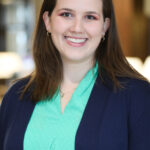 Amber Wessies is an Instruction Librarian at a private university in west Tennessee. In this position, she assists students with research through whole class instruction and individual reference appointments. Amber enjoys collaborating with university faculty to better engage and support student learning. As a former elementary school teacher, Amber sees the necessity of a team effort to encourage student learning. Amber’s research interests include teaching technology, gamification, generation Z, and engaging library instruction.
Amber Wessies is an Instruction Librarian at a private university in west Tennessee. In this position, she assists students with research through whole class instruction and individual reference appointments. Amber enjoys collaborating with university faculty to better engage and support student learning. As a former elementary school teacher, Amber sees the necessity of a team effort to encourage student learning. Amber’s research interests include teaching technology, gamification, generation Z, and engaging library instruction.
3:30 to 4:30 p.m. - Bridging the Digital Divide (During COVID-19)
Jonathan R. Wilson, East Tennessee State University
Jeri Paddock, East Tennessee State University
East Tennessee State University (ETSU) implemented new resources for students needing technology during the COVID-19 pandemic when everyone was required to work online. Sherrod Library, Academic Technology Services, and the Dean of Students provided laptops and hotspots for under incomed students and those living in rural areas or experiencing unfortunate circumstances. By using CARES Act money, 225 laptops and 200 hotspots were purchased to help those students with accessibility and lack of proper equipment. The students were also offered the services of a Personal Librarian when they checked out the equipment for the semester.
The personal librarian acts as a liaison to the students to provide information about available university and academic resources. Students were contacted weekly by email and offered Zoom sessions to assess their needs so that they could effectively succeed in academia.
In this presentation, we will discuss the need for equipment and services for at-risk students to maintain their enrollment at the university and keep the retention rate high.
We developed an assessment for all of the students who borrowed technology in order to get a better understanding of how these resources have helped them maintain enrollment in the university and how useful the availability of a personal librarian was to them. Once this information is processed, we will be better prepared to know the types of resources to offer the students for their continued success.
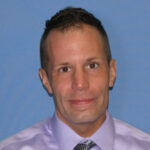 Jonathan R. Wilson is the Distance/Online Education Librarian & Coordinator at the Charles C. Sherrod Library of East Tennessee State University in Johnson City, Tennessee.
Jonathan R. Wilson is the Distance/Online Education Librarian & Coordinator at the Charles C. Sherrod Library of East Tennessee State University in Johnson City, Tennessee.
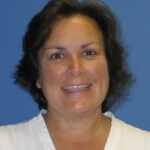 Jeri Swearingen Paddock was born and raised in the flat lands of central Illinois, and transplanted to the mountains of Upper East Tennessee. She holds a degree from Milligan College, now Milligan University. I’m a very proud Grammie of 7 grandchildren and I’m over the moon when I hit the goal of 1 week a year with my family at the beach.
Jeri Swearingen Paddock was born and raised in the flat lands of central Illinois, and transplanted to the mountains of Upper East Tennessee. She holds a degree from Milligan College, now Milligan University. I’m a very proud Grammie of 7 grandchildren and I’m over the moon when I hit the goal of 1 week a year with my family at the beach.
Executive Committee
The PILLARS Executive Committee is made up of:
Carolyn Bennett Glauda, Southeastern New York Library Resources Council – Chair
caroyln@senylrc.org
Rebecca Kluberdanz Honsinger, Central New York Library Resources Council – Technology
rkluberdanz@clrc.org
Susan D’Entremont, Capital District Library Council – Speaker Communication
susan@cdlc.org
Caitlin Kenney, Western New York Library Resources Council – Treasurer
ckenney@wnylrc.org
Christi Sommerfeldt, Northern New York Library Network – Archivist
christi@nnyln.org
Sally Stieglitz, Long Island Library Resources Council – Publicity
sstieglitz@lilrc.org
Jessica Philippe, South Central Regional Library Council
jphilippe@scrlc.org
This event was a production of Empire State Library Network (ESLN) and is co-produced by New York School Library Systems Association (SLSA).
For more information, please contact the planning committee at pillars@esln.org.
Once again, we’d like to thank our generous sponsors for allowing us to present this event at no cost to attendees.



